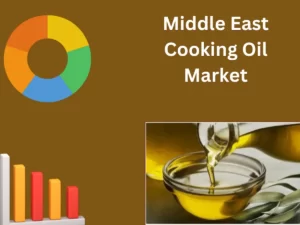
- Published 2024
- No of Pages: 200
- 20% Customization available
Middle East Cooking Oil Market Research Report, Analysis and Forecast
Middle East Cooking Oil Market Synopsis
Middle Eastern cuisine, which is renowned for its robust flavours and deep-fried foods, relies heavily on cooking oil. The Middle East has a competitive advantage in the production and supply of cooking oils because it is home to some of the top oil-producing nations in the world.

The Middle East’s expanding population and quick urbanisation are other factors that influence the region’s cooking oil usage. The demand for processed meals, which frequently have cooking oils as a main ingredient, rises as more people relocate to cities. Also, as these establishments rely significantly on cooking oils for the preparation of their food, the proliferation of fast-food chains and convenience stores has aided in the expansion of the regional cooking oil market.
Moreover, the Middle East serves as a hub for global trade and business, which has made a variety of cooking oils from around the globe available. High-quality and healthful cooking oils are preferred by Middle Eastern consumers, which has increased demand for oils like olive, sunflower, and soybean. The demand for better cooking oils with low trans-fat and saturated fat contents has also been influenced by consumers’ increased health consciousness.
Furthermore, the Middle East uses cooking oil for non-food uses as well. For example, it serves as a foundation for soaps and cosmetics as well as a fuel for lamps. This has created an additional demand for cooking oil in the region.
In conclusion, factors including the Middle East’s long culinary tradition, population expansion, urbanisation, the rise of convenience stores and fast food chains, global trade and commerce, and the preference for healthier oils all contribute to the region’s high need for cooking oil.
Middle East Cooking Oil Market: Overview
Cooking oil is a key component in Middle Eastern cuisine and is employed in a variety of ways, including frying, sautéing, dressing salads, and marinating meats. Depending on the particular cuisine and cooking style, the region uses a variety of cooking oils, such as soyoil, rapeseed/canola oil, palm oil, sunflower oil, corn oil, peanut oil, olive oil, and others.
Cooking oil is used extensively in the food service sector to prepare meals in restaurants, hotels, and other eating venues. For example, olive oil is frequently used in Mediterranean and Middle Eastern cuisine, whereas palm oil is frequently used in Asian cuisine. Each cuisine has its favoured type of oil for cooking. The type of cooking oil used is generally chosen based on the desired taste, nutrition, and smoke point.
Middle Eastern households likewise rely extensively on cooking oil for their daily culinary requirements. To attain a certain taste and nutritional profile, many homes prefer to use a combination of various oils, such as olive oil and sunflower oil.
Cooking oil is a common ingredient in a wide variety of food products, including snacks, baked goods, and processed foods, in the food processing business. The finished product’s desired flavour and nutritional composition influence the choice of cooking oil.
Overall, cooking oil is a critical component of Middle Eastern cuisine and is an essential ingredient in many traditional dishes. Its demand is primarily driven by the growing food service industry, household consumption, and the food processing industry.`
Saudi Arabia Cooking Oil Market Synopsis
The Cooking Oil market in Saudi Arabia is growing due to the increasing demand for healthier cooking options. The country has seen a rise in health-conscious consumers, who are looking for healthier alternatives to traditional cooking oils. This has led to an increase in the demand for vegetable and olive oils, which are seen as healthier options than traditional cooking oils. Additionally, the Saudi government has implemented various initiatives to promote healthy eating habits, which has further increased the demand for healthier cooking oils.
UAE Cooking Oil Market Synopsis
The UAE Cooking Oil market is also growing due to the increasing number of expatriates living in the country. These expatriates come from different countries and cultures, and they bring with them their culinary traditions and preferences. This has led to an increase in the demand for different types of cooking oils, such as olive oil, sunflower oil, and coconut oil. Additionally, the UAE government has implemented various initiatives to promote healthy eating habits among its citizens, which has further increased the demand for healthier cooking oils.
Middle East Cooking Oil Market: Segmentation
The middle east has cooking oil market has been segmented into By Type and Application.
Based on the Type, the middle east has a cooking oil market in Soy oil, Rapeseed/Canola Oil, Palm Oil, Sunflower Oil, Corn Oil, Peanut Oil, Olive Oil, and Others. In 2021, the soy oil segment held a significant share. This was brought on by the rising need for soy oil in applications for food and drink. Given that it includes omega-3 fatty acids and is low in saturated fat, soybean oil is a better option than other oils. In addition, it is utilised in industrial and personal care goods. In addition, soy oil is favoured by many customers since it is thought to be a more sustainable oil than other edible oils. For instance, soy oil can be found in foods like salad dressings and margarine. It is a preferred option among food producers because it is employed as frying and baking oil in restaurants.
Based on Application, the market is classified as Food Service, Household, and Food Processing. In 2021, the segment is expected to account for a significant share of households. In 2021, the segment is expected to account for a significant share of households. The global cooking oil market is expected to witness rapid growth in the coming years, driven by the rising demand for healthy and nutritious cooking oil among households. For instance, plant-based cooking oils such as corn oil, sunflower oil, soybean oil, and canola oil are increasingly being preferred by consumers over traditional animal fat-based cooking oils such as lard and butter.
Recent Developments
In 2021, the Middle East cooking oil space saw a number of significant developments.
- In January 2021, The UAE-based cooking oil producer Al Ghurair Foods announced its merger with Saudi Arabia’s Almarai, creating one of the largest food companies in the region. The combined entity will have a presence in more than 20 countries and will be able to leverage its scale to expand into new markets.
- In February 2021, Saudi Arabia’s Savola Group launched a new cooking oil brand called “Savola Gold”. The product is made from 100% pure sunflower oil and is designed to meet the needs of health-conscious consumers. The company also announced plans to expand its production capacity to meet the growing demand for its products.
- In March 2021, Kuwait-based Al Kout Foodstuff Company launched a new range of cooking oils under the brand name “Al Kout Gold”. The product is made from 100% pure vegetable oils and is designed to provide consumers with healthier options for their cooking needs.
- In April 2021, Qatar-based Qatofin launched a new range of cooking oils under the brand name “Qatofin Gold”. The product is made from 100% pure vegetable oils and is designed to provide consumers with healthier options for their cooking needs.
In 2022, there were several acquisitions in the Middle East cooking oil company space.
- In February 2022, the UAE-based food and beverage company Al Islami acquired a majority stake in the Saudi Arabian cooking oil company Al-Jazirah. The acquisition was part of Al Islami’s strategy to expand its presence in the Middle East cooking oil market.
- In April 2022, the Kuwait-based food and beverage company Kout Food Group acquired a majority stake in the Bahraini cooking oil company Al-Khalij. The acquisition was part of Kout Food Group’s strategy to expand its presence in the Middle East cooking oil market.
- In June 2022, the Qatar-based food and beverage company Qatar National Food Security Company acquired a majority stake in the Omani cooking oil company Al-Hilal. The acquisition was part of Qatar National Food Security Company’s strategy to expand its presence in the Middle East cooking oil market.
The Middle East Cooking Oil Market is segmented as follows
By Type
- Soyoil
- Rapeseed/Canola Oil
- Palm Oil
- Sunflower Oil
- Corn Oil
- Peanut Oil
- Olive Oil
- Others
By Application
- Food Service Outlets
- Household
- Food Processing
By Region
- The Middle East
- Saudi Arabia
- UAE
- Qatar
- Kuwait
- Oman
- Rest of the Middle East
“Every Organization is different and so are their requirements”- Datavagyanik
Companies We Work With






Do You Want To Boost Your Business?
drop us a line and keep in touch

